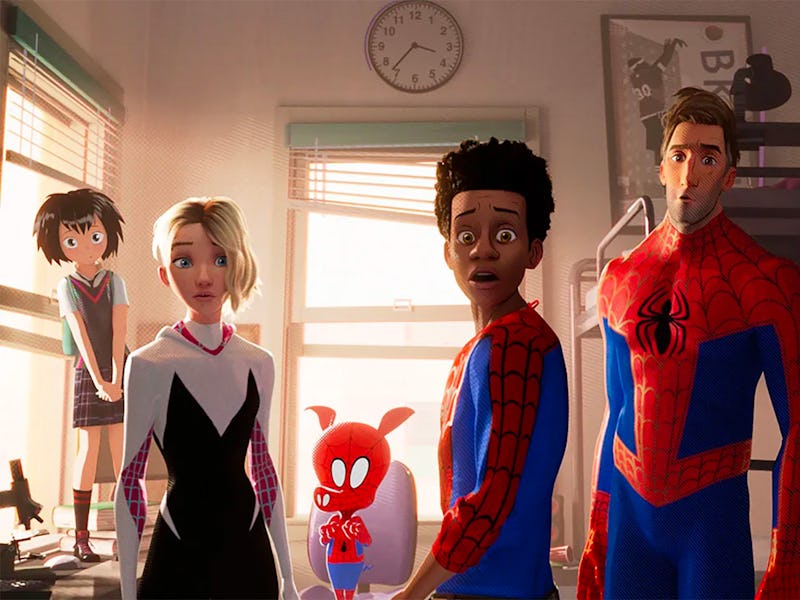The Multiverse is Overstaying Its Welcome
The multiverse is nothing new, but it’s suffering under Hollywood’s obsession with Easter eggs.

It’s no secret that the multiverse is having a major moment right now. What once existed on the fringes of scientific theory — and on the pages of comic books — is now a cultural staple. Marvel Studios and its rivals at DC have been steadily adapting their own respective multiverses for the screen, but it’s not just a platform for superheroes. Even indie family dramas, like Everything Everywhere All At Once, are cashing in on the concept. They’re even winning Oscars for it.
The multiverse essentially allows what is to coexist alongside what could be. It’s a brilliant way to remix and riff on our most familiar pop culture figures, and to explore the diversity of our world on an exponential level. For Marvel, it’s the final frontier: their cinematic universe is expanding beyond the point of sustainability, so multiple parallel timelines seems like the only feasible way forward.
Since the announcement of Doctor Strange in the Multiverse of Madness in 2019, Marvel’s latest multi-chapter saga is all about the multiverse, and they’re wasting no time expanding their catalog to new heights. In a lot of ways, this latest push is any comic fan’s dream. So why does the multiverse already feel so stale?
Doctor Strange in the Multiverse of Madness kicked off Marvel’s multiverse obsession — but at what cost?
There’s nothing inherently wrong with the multiverse on its own. Like any storytelling tool, it depends on how it’s used. When done right, the multiverse allows worlds to collide and different kinds of heroes to step out of the margins. Marvel’s What If...? may be one of the better examples of the multiverse done right: the series explores theoretical timelines in which King T’Challa leads the Guardians of the Galaxy, or Peggy Carter was exposed to a super serum. Apart from Captain Carter and a nefarious Doctor Strange variant, the characters in What If...? exist without any pressure to cross over. The episodes that introduce them to the multiverse feel more like fun exercises in the hypothetical than any concerted efforts to cash in on existing IP.
Then, of course, there’s Sony’s Spider-Man: Into the Spider-Verse, which allows diverse iterations of one very familiar hero to fight side-by-side. It took the idea that anyone can be a hero and immersed it in an achingly specific perspective. And its sequel, Across the Spider-Verse, only expanded on that point — albeit with slightly more unwieldy plot.
In the right hands, the multiverse can be a fun way to remix familiar characters.
But Spider-Verse and Everything Everywhere have quickly become the exceptions to this new practice, not the standard. With recent efforts like Spider-Man: No Way Home, Doctor Strange in the Multiverse of Madness, and The Flash, the multiverse has become another business tactic.
Granted, it’s an incredibly lucrative one: No Way Home earned a cool billion at the box office. But it was also a very clear opportunity to recycle elements from the more impactful Spider-Man sagas, and even a beloved character from Netflix’s defunct Marvel universe, Daredevil.
The same could be said of Multiverse of Madness and The Flash. While the former definitely finds a few ways to lampoon our new fixation with cameos and infinite worlds, its efforts still ring a bit hollow at the end of the day. But it’s The Flash that may embody just how lazy studios can get with the multiverse. The film is absolutely zealous in its quest to wrangle a sprawling catalog of heroes into one timeline, but it’s clear that DC and Warner Bros. have no idea who audiences might actually want to see. So many of The Flash’s cameos are more head-scratching than genuinely exciting; when the film isn’t scraping the bottom of the barrel for another deep cut, it’s resurrecting deceased actors with rubbery CGI.
It’s not that the multiverse itself is bad, but in the wrong hands. The multiverse has become a vessel for Hollywood’s IP obsession. Studios know that nostalgia sells: just look at the revolving door of sequels and spinoffs that have dominated the past decade.
The multiverse allows everything to exist at once, but it can also be an excuse to lean back on past work. In most cases, these films don’t introduce anything new, and that only exacerbates the superhero fatigue many have been grappling with for years now. If Marvel wants to continue to lean on multiversal storytelling, as will be the case with Deadpool 3 and more, it needs to reevaluate why the concept worked in the first place.
This article was originally published on